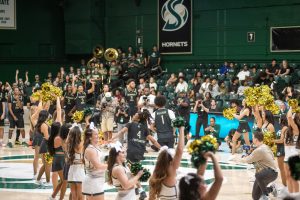Athletics checks up on Web profiles
January 6, 2007
There was a simpler time.
Back in the day (a few years ago to be precise), college students had to meet face-to-face in order to get to know each other’s innermost thoughts and feelings.
With the advent of Web sites such as MySpace, Yahoo 360 and Friendster, much of what was once private is out in the public realm, and student-athletes are being asked by athletic department officials to clean up their online identities.
Mark McGushin, Life Skills Coordinator in the athletic department, sent out a mass e-mail to Hornet athletes before finals last semester saying he had logged onto Facebook.com and had “found many of our student-athletes had pages on the Web site and that some of the information that student-athletes had posted was questionable (photos of student-athletes drinking, foul language, etc.).” McGushin also warned the athletes that he would be encouraging coaches to set up accounts so they can check athletes’ Internet profiles.
Some information that athletes post about themselves may be viewed as destructive to the image of the school and to the athletes themselves, McGushin said.
“I think that it’s becoming a national issue and we have started some informal dialogue related to that issue,” Sac State athletic director Terry Wanless said. “With the new Title V issue, the university has the authority to hold students accountable for their activity (online).”
Women’s basketball center Ashley Jackson understands the reasoning behind Title V, a student conduct code that allows the campus to punish students based on their Internet content. At the same time she believes that the athletes deserve some type of privacy.
“Just because (an online profile) is there doesn’t mean it’s there for you to look at,” Jackson said. “What’s on Myspace doesn’t have anything to do with what’s going on in my sport.”
Sac State expects all student-athletes to behave in a way that is adherent to the athletic department’s philosophy at all times, Wanless said. According to the student-athlete code of conduct, this includes acting with integrity, good sportsmanship and commonly acceptable standards of social and physical behavior.
“Schools all over are saying, ‘How are we going to deal with Facebook, Myspace, Friendster and the issues that are coming in related to what students are posting out there?’ ” McGushin said. “It’s certainly a very hot topic among the NCAA and concerns student-athletes who are representing their institution and what they are posting online.
In his e-mail to athletes, McGushin told them that they are “ambassadors to the university.” He added that violation of the conduct code could lead to “suspension, loss or reduction of scholarship and/or dismissal from the team.”
“Some of the problems in the NCAA has been that before another team comes in the student section will look at Facebook and look at what people have said about themselves and they’ll taunt them with it in a contest,” McGushin said.
In a sampling of 15 Hornet athletes’ Myspace profiles, most were found to be clean. One profile, however, showed an underage athlete at an over-21 bar. On another profile, a group photo shows several athletes drinking from red party cups. Infractions such as these would most likely lead to a verbal warning, according to McGushin.
“Athletics is a privilege. When (the students) accept the opportunity to become a student-athlete, they accept a level of responsibility that the normal student doesn’t have,” Wanless said. “They don’t have the luxury of taking off that jersey and going out and being irresponsible.”
Armando Botello II can be reached at [email protected]






















































































































